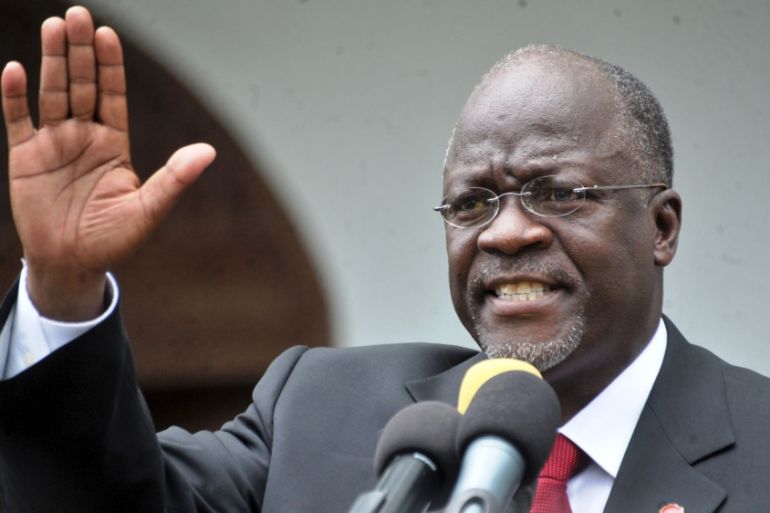Tanzania Daima ban adds to press freedom concerns
Critics accuse President John Magufuli of undermining democracy after fourth critical newspaper is shut down since June.

A 90-day ban on a popular Swahili daily in Tanzania – the fourth newspaper to be shut down since June – has prompted concern over press freedom in the East African country.
Journalists and activists urged President John Magufuli on Wednesday to overturn the ban on the Tanzania Daima newspaper, and accused him of undermining the country’s democracy by muzzling the media.
Keep reading
list of 4 itemsLawmakers brawl as Georgian Parliament considers ‘foreign agent’ bill
Journalist loses foot after being badly wounded in Israeli attack in Gaza
Press freedom group says representative denied entry to Hong Kong
The call came a day after the opposition-leaning paper, which has a daily circulation of 30,000, was shut down for three months. Authorities accused it of continuously spreading “false information” after it published an incorrect claim about the number of Tanzanians taking anti-retroviral drugs used to treat HIV.
Serikali imelichukulia hatua za kisheria gazeti la Tanzania Daima kwa mwendelezo wa kuandia habari za uongo….Taarifa kamili inakuja. pic.twitter.com/QiVFhJnmQq
— Msemaji Mkuu wa Serikali (@TZMsemajiMkuu) October 24, 2017
Martin Malera, the paper’s acting managing editor, said the government’s decision was “unfair” and “unlawful”.
“We put an apology on the front page of our paper on Monday, and they still took the decision to ban our paper,” he told Al Jazeera.
“How can they ban a paper that employs nearly 300 people because of the mistake of one editor or journalist?”
Since Magufuli assumed office in October 2015, several newspapers have been shuttered and two radio stations were temporarily taken off the air.
His government also stopped the live transmission of parliamentary debates shortly after coming to power.
MwanaHalisi, a critical newspaper, was slapped with a two-year ban in September over allegations it incited violence and tarnished Magufuli’s image. That same month, the weekly paper Raia Mwema was shuttered for 90 days after it published an article titled, John Magufuli’s, Presidency is Doomed to Fail.
Authorities in June also suspended the publication of Mawio, a privately owned weekly, for two years after it linked two former presidents to allegations of misconduct in the mining sector.
Neville Meena, a journalist who heads the Editor’s Forum, said the suspension of Tanzania Damia was part of a wider trend of “shrinking democracy” and a “crackdown” on dissent in the country.
“This decision is extreme and undermines media freedom,” Meena told Al Jazeera. “We have never had this many papers banned at one time. We cannot afford to tolerate this situation any more.”
The shutdown of critical media has led journalists to practise self-censorship, he said.
“People are careful not to make the government angry in their writing, because after Tanzania Daima, they don’t know who’s next?”
Hassan Abbasi, director-general of Tanzania’s Information Services, denied allegations of muzzling the press, saying the government had warned Tanzania Daima over “false news” on several occasions before imposing the ban.
“After six warnings, the government felt this was the right time to take action,” he told Al Jazeera.
A media law passed in 2015 allowed the government to ban the publication of any content on public safety and national security grounds, he added.
“Tanzania has more than 400 newspapers and magazines, publishing monthly, daily and annually. They are working freely without harassment,” Abbasi said.
New York-based Committee to Protect Journalists (CPJ) has urged Magufuli to “do the right thing” by overturning the ban and repealing repressive media laws.
Angela Quintal, CPJ’s Africa programme coordinator, in an emailed statement, said the ban on yet another newspaper showed Magufuli “would rather embrace censorship instead of encouraging media diversity and freedom of the press”.
Tanzania is ranked 83rd out of 180 countries in the Reporters Without Borders’ World Press Freedom Index.